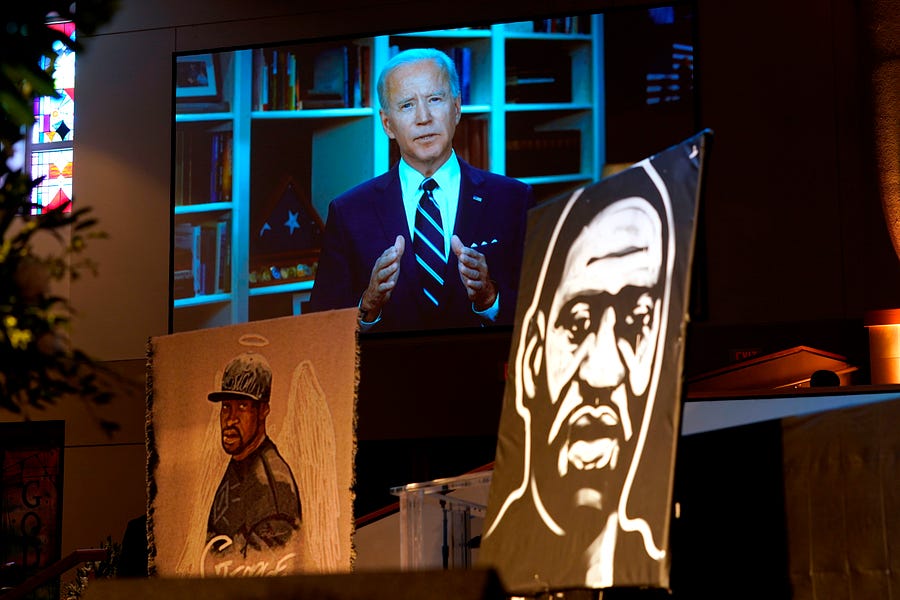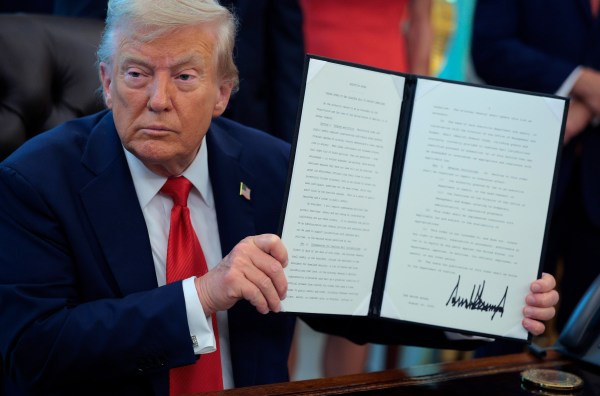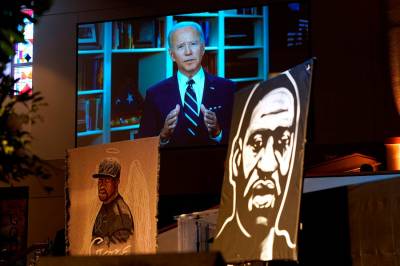Former Vice President Biden and President Trump were both, in their own unique ways, addressing the biggest story of the past few weeks.
It was Tuesday, June 9, and Joe Biden was speaking—virtually—at the funeral of George Floyd, the black man whose death under the knee of Minneapolis police officer Derek Chauvin tore the Band-Aid off the racial wound in America that all too many had been all too willing to ignore. “To George’s family and friends, Jill and I know the deep hole in your hearts when you bury a piece of your soul deep in this Earth,” Biden said in a video that played over the faint tickling of piano keys in Houston’s Fountain of Praise church. “We know you will never feel the same again. … Unlike most, you must grieve in public. It’s a burden. A burden that is now your purpose to change the world for the better, in the name of George Floyd.”
That same morning, Donald Trump’s attention was focused on the widespread protests and unrest that had beset the country in the wake of Floyd’s killing. “Buffalo protester shoved by Police could be an ANTIFA provocateur,” he tweeted, referencing a viral video in which a 75-year-old man was pushed to the sidewalk by police and could be seen bleeding from his ear. “He fell harder than was pushed. Was aiming scanner. Could be a set up?”
This is not to say Trump hasn’t discussed Floyd’s death—he has. “The death of George Floyd on the streets of Minneapolis was a grave tragedy. It should never have happened,” he declared on May 30 after the launch of the SpaceX Crew Dragon spacecraft in Cape Canaveral, Florida. “I understand the pain that people are feeling.” But off-prompter the president quickly returned to his preferred “law and order” message on the demonstrations, and a week later was in the Rose Garden imagining Floyd “looking down” and saying of what had happened in his name since his death, “This is a great thing that’s happening for our country.”
“This is a great day for him,” Trump added.
These anecdotes represent a tiny fraction of the various issues that will be weighing on voters’ minds when they head to the ballot box in November, but they speak to a growing problem for the president and his quest for a second term. In a campaign that, as of now, is defined by a pandemic, mass unemployment, and a citizenry increasingly coming to terms with racial injustices, Trump has an empathy problem—and it’s only getting worse.
This isn’t a new conundrum for Trump: Even some of his staunchest supporters wouldn’t describe the president as compassionate—the brashness is part of the appeal. But 2020 is not 2016, and Joe Biden is not Hillary Clinton. Trump was able to squeak out a victory in the Electoral College four years ago with only 44 percent likely voters thinking he “cares about average Americans,” in large part because only 53 percent thought his Democratic opponent did. In an August 2016 NBC News/Wall Street Journal poll, one in five respondents reported believing neither major-party candidate cared about people like them.
That is decidedly not the case this year. What was a 9-point empathy gap between Trump and Clinton in 2016 has grown to 19 points with Joe Biden on the ticket. Sixty-one percent of registered voters in a May poll from Quinnipiac University think Biden cares about average Americans—an eight-point increase over Clinton overall, but a 15-point increase with independents and a 6-point increase among Republicans. The former vice president’s numbers on the question improved by two points since March—taking into account his forcefully denial of a sexual assault allegation made by former Senate staffer Tara Reade.
“I think the Trump campaign has to be perpetually professionally paranoid simply because of the narrowness of his majority in 2016 and the lack of apparent ability to expand that coalition going into 2020,” said Michael Steel, a veteran of several Republican presidential campaigns. “They have to be cognizant of the fact that Secretary Clinton brought huge negatives—built by decades of unpopularity—into the 2016 race. So running against former Vice President Biden—who doesn’t have nearly that kind of baggage—is an inherently more difficult challenge.”
Steel worked on Mitt Romney’s 2012 campaign, where the candidate was, like Trump, dogged by an inability to radiate compassion with the majority of the country—albeit for entirely different reasons. Mike Huckabee, Romney’s rival for the GOP nomination in 2008, savaged the former head of Bain Capital with a line that reverberated four years later: “I want to be a president who reminds you of the guy you work with, not the guy who laid you off.” Romney’s leaked “47 percent” comments—in which he appeared to write off nearly half the country as people “dependent upon government” who will vote for Barack Obama “no matter what”—only solidified an existing perception.
Exit polls in 2012 illustrated just how damaging this image was for Romney. Barack Obama maintained a 10-point advantage on being “in touch” with average Americans, per ABC News, and won voters who prioritized empathy by an extraordinary 63 points. It didn’t matter that Romney won those who cared about a candidate “sharing their values,” “being a strong leader,” or “having a vision for the future”—the cake was already baked.
In many ways, the issues at hand in 2012 seem quaint compared with the various catastrophes of the past four months. If empathy was important eight years ago, it’s hard to imagine it won’t be doubly so in November, when we could be nearing 200,000 dead from the coronavirus and have tens of millions out of work. President Trump’s culture war over Confederate monuments, incessant bashing of the news media, and photo op in front of St. John’s Church will undoubtedly excite his existing base of voters. But—as Biden’s 8-point lead over Trump in the RealClearPolitics polling average suggests—these battles are cold comfort to the millions of Americans dealing with loss and looking for leadership through one of the most harrowing periods in recent U.S. history.
“We expect the American president to offer words of comfort and healing and unity in the face of national crises,” Steel noted, “and President Trump either refuses or seems very awkward when he tries.”
The Trump campaign, for its part, did not directly address the question of the president’s capacity for empathy in a statement provided to The Dispatch, opting instead to focus on his actions. “President Trump has proven he is the leader we need in these tough times,” spokesman Ken Farnaso said in an email. “In the face of the pandemic, President Trump implemented a Whole-of-America approach leading to the greatest public and private sector mobilization effort since WW2. Following the tragic death of George Floyd, President Trump swiftly called on the Department of Justice to investigate the heinous actions of the Minneapolis police officers involved. Despite false narratives promoted by the Democrats and media, the President’s unifying message is resonating with Americans throughout our country while Joe Biden continues to lean on divisive rhetoric and broken policies.”
The Biden campaign did not respond to a request for comment, but allies believe the former vice president’s entire life—tragedies and all—has prepared him for this moment. “I think he has a unique ability to connect with people in such a way because of his sets of life experiences,” Democratic strategist Antjuan Seawright told The Dispatch. “We’ve lived through some of the experiences Joe Biden has had with one of his kids, he lost his wife. We lived through that, but we’ve also been with him while he’s been able to console other people and help them get through their experiences.”
Biden’s first wife, Neilia, and his daughter, Naomi, were killed in a car accident just after Biden, 30, was first elected to the Senate. His oldest son, Beau, died from brain cancer in 2015 at the age of 46. And like George Floyd’s daughter Gianna and his brother Philonise, Biden grieved in public. And for the most part, America grieved with him.
It’s apparent that he’s now trying to return the favor. “I know it’s incredibly difficult right now,” he said in a video message directed at those who have lost a loved one to COVID-19. “But there will come a time when their memory brings a smile to your lips before it brings a tear to your eye. It will take time, but that’s when you know you’re going to make it.”
The line—and it is a line—dates back to Biden’s time as vice president, if not earlier. But if it feels genuine, it could simply be because it is. Biden, in many ways, has come to be defined by his losses. “He knows what you’re going through,” Sen. Chris Coons told the Associated Press of Biden’s consolation when Coons’ father died. “He knows that you can come through it.”
More than any particular policy prescription, the former vice president has staked his campaign on the idea that “we’re in a battle for the soul of America.” Voters routinely give Trump higher marks than his Democratic challenger on the economy, but if Biden is right, that might not matter.
“You might not agree with the politics of Joe Biden always,” Seawright concluded. “But the personality of Joe Biden, most people embrace.”
Photograph by David J. Phillip/pool/AFP/Getty Images.







Please note that we at The Dispatch hold ourselves, our work, and our commenters to a higher standard than other places on the internet. We welcome comments that foster genuine debate or discussion—including comments critical of us or our work—but responses that include ad hominem attacks on fellow Dispatch members or are intended to stoke fear and anger may be moderated.
With your membership, you only have the ability to comment on The Morning Dispatch articles. Consider upgrading to join the conversation everywhere.